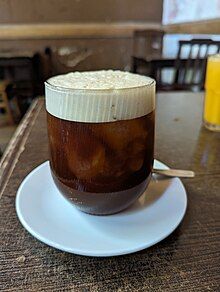Espresso and tonic
| Cocktail | |
|---|---|
 Espresso and tonic (Japan, 2023) | |
| Type | Mixed drink |
| Commonly used ingredients | Espresso Tonic water |
Espresso and tonic or espresso tonic is a non-alcoholic mixed drink made by mixing espresso and tonic water. First recorded in 2007, the drink became popular in Scandinavia before spreading to North America, Japan, and around the world. The key ingredients are espresso and tonic water, but other flavourings may be added.
History
[edit]Whilst tonic water was patented in 1858 in London[1] and espresso machines were invented in 1905 in Italy,[2] the first record of this drink's creation was in Oslo in 2007.[3] There it was mixed by a barista working with the future founders of the Swedish company Koppi Roasters, Anne Lunell and Charles Nystrand.[3] Later that year, it was featured on the menu of Koppi Roasters in Helsingborg as Kaffe & Tonic.[3][4] Its popularity grew in Scandinavia and by the 2010s, the drink had spread to North American coffee culture as a result of international barista competitions.[3] By 2015, the drink had also spread to Japan.[5] The drink has been associated with "barista fashion" by historian Wendy Pojmann.[6] In 2019, the British coffee chain Caffè Nero partnered with the beverage company Fever-Tree to sell two variations of the drink in its outlets.[7]
Presentation
[edit]
The drink is traditionally created by pouring espresso over iced tonic water, creating a layered drink. If the tonic is poured onto espresso, a head of foam is created on the drink.[8] The drink can also include sugar syrup, a lemon garnish,[8] or other flavours such as cherry,[9] lime, or honey.[10] It is Japanese baristas who are credited with adding additional flavours to the drink first.[5] Suggestions for serving include using a Collins glass, and with a straw.[11]
See also
[edit]References
[edit]- ^ "Just the tonic: A natural history of tonic water | Kew". www.kew.org. Retrieved 2023-12-02.
- ^ Morris, Jonathan (2007), "The Cappuccino Conquests. The Transnational History of Italian Coffee", University of Hertfordshire, p.5.
- ^ a b c d "Deep Dive: What Is an Espresso Tonic? | Trade Coffee". www.drinktrade.com. Retrieved 2023-11-19.
- ^ "Coffee Drinks Stake a Claim at the Bar - The New York Times". The New York Times. 2023-11-19. Archived from the original on 2023-11-19. Retrieved 2023-11-19.
- ^ a b Martin, Deborah (2023-01-16). "What Makes Japan's Sparkling Coffee Unique?". Tasting Table. Retrieved 2023-11-19.
- ^ Pojmann, Wendy (2020-05-20). "Barista Cool: Espresso Fashion Transformed". ZoneModa Journal. 10 (1S): 213–227. doi:10.6092/issn.2611-0563/10567. ISSN 2611-0563.
- ^ Woolfson, Daniel. "Fever-Tree partners with Caffè Nero for 'Espresso & Tonic' drinks". The Grocer. Retrieved 2023-11-19.
- ^ a b "We're Calling It Now, the Espresso Tonic Is the Drink of the Summer". Food & Wine. Retrieved 2023-11-19.
- ^ Qureshi, Hira (5 July 2023). "Philly baristas are obsessed with espresso tonics — and you should be, too". Inquirer. Retrieved 2023-11-19.
- ^ Janzen, Emma (2021-08-17). "Five Takes on the Coffee & Tonic". Imbibe Magazine. Retrieved 2023-11-19.
- ^ Alchemist, The (2021-05-06). The Alchemist Cocktail Book: Master the dark arts of mixology. Random House. ISBN 978-1-4735-8350-4.
